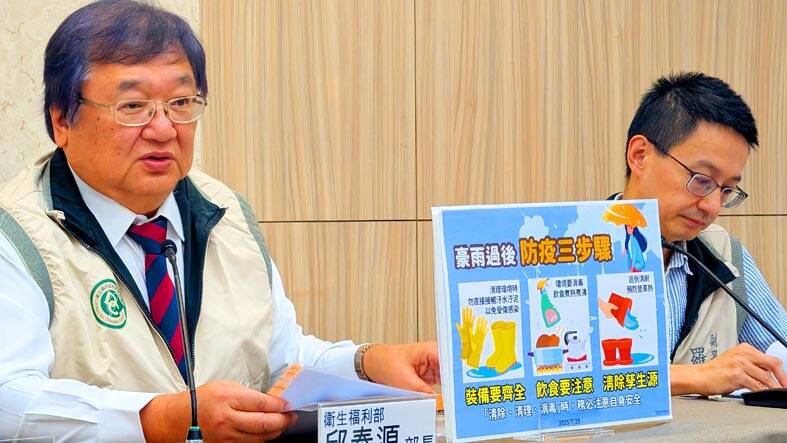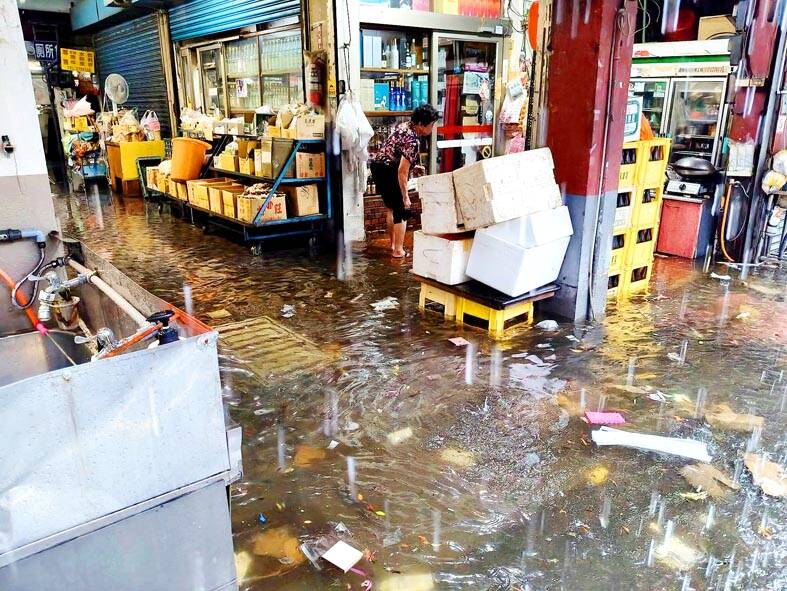People should clean up after heavy rainfall and flooding, and take measures against infectious diseases, the Centers for Disease Control (CDC) said yesterday.
Pools of stagnant water have formed and many areas faced flooding after heavy rain recently, heightening the risk of leptospirosis, melioidosis, gastrointestinal diseases and other infectious diseases from contaminated water or soil, Minister of Health and Welfare Chiu Tai-yuan (邱泰源) told a news conference in Taipei.
To reduce the risk of disease, people in flooded areas should wear protective clothing and equipment when cleaning their living environment, pay attention to food hygiene — including by boiling drinking water and cooking food thoroughly — and remove stagnant water to eliminate mosquito breeding sites, Chiu said.

Photo: CNA
CDC Deputy Director-General Chuang Jen-hsiang (莊人祥) said leptospirosis is a bacterial disease mainly spread through the urine of infected animals, which can contaminate floodwater and enter the human body orally or through open wounds.
The bacteria that cause melioidosis and tetanus are commonly found in soil, Chuang said, adding that strong winds and heavy rain during typhoons can cause the bacteria to spread in the air and water.
People with diabetes or immunocompromised people have increased risk of infection, he said.

Photo courtesy of Yang Shih-hsu via CNA
“People should wear waterproof boots, gloves and masks when cleaning up after heavy rain, and avoid scrapes or cuts,” Chuang said, adding that water storage facilities should be thoroughly disinfected and furniture washed with diluted bleach if they have been flooded.
Stagnant water in plant pots or containers after rainfall should be removed immediately, as they can become breeding grounds for mosquitoes, increasing the risk of dengue and chikungunya fever, he said, adding that no local cases have been reported recently, but people who get infected overseas might spread the diseases when they return to Taiwan.
Four new cases of melioidosis — three in Kaohsiung and one in Tainan — were reported last week, bringing the total to 10 cases, including two deaths, since Typhoon Danas early this month, CDC Deputy Director-General Philip Lo (羅一鈞) said.
Of the four new cases reported, the most severe was a man in his 60s in Tainan who has diabetes and cardiovascular disease, Lo said.
The man had a fever and chest tightness for five days in the middle of the month, Lo said, adding that he tested positive for melioidosis and was hospitalized with low blood pressure and septic shock.
The man was admitted to an intensive care unit (ICU) and his condition improved, Lo said, adding that he was expected to be moved to a general hospital ward yesterday.
With heavy rain forecast in several areas, the CDC has notified healthcare professionals to remain vigilant for the diseases and report suspected cases, Lo said.
People who develop symptoms should seek medical attention as soon as possible, he added.
CDC Epidemic Intelligence Center Deputy Director Lee Chia-lin (李佳琳) said that 32 cases of locally acquired melioidosis have been reported so far this year, the most in the period in five years.
Last week there were two reports of newborns developing severe enterovirus, Lee said, adding that one of the babies died.
Both had echovirus 11, she said.
CDC physician Lin Yung-ching (林詠青) said that the newborns were both four days old.
The mother of the child who died developed a fever and shortness of breath about a week before giving birth, Lin said.
The baby, who was premature, developed respiratory distress and was admitted to an ICU, but died of enterovirus infection and sepsis, Lin added.
The other baby was also admitted to an ICU with a fever, frequent pauses in breathing, elevated liver enzymes, a low blood platelet count and low blood pressure, he said.
The child’s condition improved after two weeks of treatment and they have been discharged from hospital, he said.
Prior to the birth, the infant’s father and sibling had fevers and coughs, Lin said.
Adults with enteroviruses might have mild or no symptoms, so pregnant women should pay special attention to their health and take preventive measures to reduce the risk of infection before giving birth, he said.

The manufacture of the remaining 28 M1A2T Abrams tanks Taiwan purchased from the US has recently been completed, and they are expected to be delivered within the next one to two months, a source said yesterday. The Ministry of National Defense is arranging cargo ships to transport the tanks to Taiwan as soon as possible, said the source, who is familiar with the matter. The estimated arrival time ranges from late this month to early next month, the source said. The 28 Abrams tanks make up the third and final batch of a total of 108 tanks, valued at about NT$40.5 billion

Two Taiwanese prosecutors were questioned by Chinese security personnel at their hotel during a trip to China’s Henan Province this month, the Mainland Affairs Council (MAC) said yesterday. The officers had personal information on the prosecutors, including “when they were assigned to their posts, their work locations and job titles,” MAC Deputy Minister and spokesman Liang Wen-chieh (梁文傑) said. On top of asking about their agencies and positions, the officers also questioned the prosecutors about the Cross-Strait Joint Crime-Fighting and Judicial Mutual Assistance Agreement, a pact that serves as the framework for Taiwan-China cooperation on combating crime and providing judicial assistance, Liang

A group from the Taiwanese Designers in Australia association yesterday represented Taiwan at the Midsumma Pride March in Melbourne. The march, held in the St. Kilda suburb, is the city’s largest LGBTQIA+ parade and the flagship event of the annual Midsumma Festival. It attracted more than 45,000 spectators who supported the 400 groups and 10,000 marchers that participated this year, the association said. Taiwanese Designers said they organized a team to march for Taiwan this year, joining politicians, government agencies, professionals and community organizations in showing support for LGBTQIA+ people and diverse communities. As the first country in Asia to legalize same-sex

MOTIVES QUESTIONED The PLA considers Xi’s policies toward Taiwan to be driven by personal considerations rather than military assessment, the Epoch Times reports Chinese President Xi Jinping’s (習近平) latest purge of the Chinese People’s Liberation Army (PLA) leadership might have been prompted by the military’s opposition to plans of invading Taiwan, the Epoch Times said. The Chinese military opposes waging war against Taiwan by a large consensus, putting it at odds with Xi’s vision, the Falun Gong-affiliated daily said in a report on Thursday, citing anonymous sources with insight into the PLA’s inner workings. The opposition is not the opinion of a few generals, but a widely shared view among the PLA cadre, the Epoch Times cited them as saying. “Chinese forces know full well that